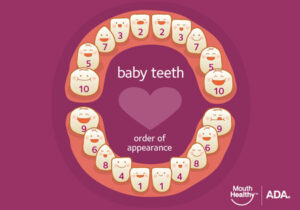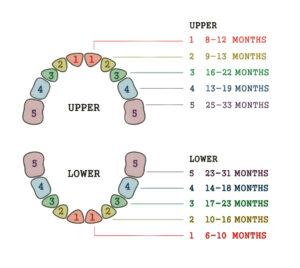July 23rd, 2021

Baby teeth growing in! This is a big topic amongst parents of our youngest patients. "When should I expect the teeth to come in?" and "My other kid got their teeth by this time already but she's not growing any yet" are just some common things that we hear from parents!

The chart above shows you when we expect the different baby teeth to grow in. Usually by 3 years of age, your child should have all 20 baby teeth. BUT! The most important thing to remember is that every child is different! Not everyone gets their baby teeth in at the same time.
When pediatric dentists check your child's mouth, we are not going through a checklist to see if the teeth that are supposed to be there have come in. We are looking at the order that the different type of teeth come in, and we are feeling your child's gums to see if we can feel under the gums the baby teeth that haven't come yet.
If teeth grow in out of order, this may point to certain reasons such as: your child may be missing the tooth that hasn't come in yet, there may be something in the gums/bone that is preventing the tooth to come in, or your child's tooth is just taking its time to come in! Even if teeth grow in out of order, it isn't an immediate reason to worry!
Your dentists are always there to help answer any questions you may have and to help your child develop their beautiful smile!
May 14th, 2021
Is your child in the stage where they are starting to drool a lot, they have the urge to bite everything, and you are starting to see little teeth come in? It's an exciting time! - your child is teething! We know teething can be extremely difficult and uncomfortable for some children, and it becomes a difficult time for the parents as well. Because we know how hard it is, here are some tips to help you and your family get through the teething process:
- Frozen towels - Wet a soft towel and place it into your freezer until the towel is cold but NOT frozen or hard. This is the safest and best option to have your child chew on! The towel is soft so that there is no harm to your child's mouth and the cold will help relieve their discomfort!
- Soft teething toys - Any teething toy that is soft in nature is great, such as the toys that you can throw into the freezer. Any toy works as long as it is soft. You want to avoid any hard plastic toys because they can easily break off and create a choking hazard for your child.
- Avoid teething medications - You want to avoid giving your child medications that are specifically for teething. The medications made for teething may not be at a healthy and safe level for your child. Avoid especially any topical ointments with anesthetic since it may not be safe for your child, such as Orajel. If needed, you can give your child Children's Tylenol to help with any fevers that come with teething.
Your dental family is always here to support you with any questions you may need! If you have any questions, please don't hesitate to ask!
April 19th, 2021
We all know the golden rule for brushing - brush two times a day, two minutes each time. But how can we make brushing fun for kids? We get this question a lot from parents since it is so hard to get their kids motivated to brush. There are many ways to get your kids brushing, but here are a few of our favorites!
- Brushing Tunes! - Have your child choose their favorite song and have them brush for the full amount of time that the song plays for. Because we want your child to brush for at least 2 minutes, make sure the song lasts for that amount of time!
- Brushing Sticker Chart - Create a calendar where you reward your child with a sticker for every morning and every night that they brush their teeth. At the end of the month, if they were able to get a full chart of stickers, you can reward them with a prize of your choice!
- Brushing Together - Some children, especially the younger ones, love watching and copying what their parents do. If you brush together, it becomes a family activity that they'll get used to doing.
The biggest thing about brushing habits is creating a routine. Our favorite routine is brush, book, bed - the three B's! Brush your teeth, settle down with a bedtime story/book, and then get tucked into bed.
We hope these tips help you and your family - let us know what works for you! And please share with us any other great ideas your family has to make brushing fun!
February 19th, 2021
In honor of National Children's Dental Health Month, we wanted to talk about a really important topic to us. We often hear "but they're just baby teeth, do they really need to be fixed? Aren't they going to fall out anyways?" Although it is true that baby teeth do fall out and new adult teeth come in, not treating baby teeth can cause a lot more harm than we think!
What happens when we don't treat cavities in baby teeth?
- Cavities can grow really big and affect the nerve inside the tooth. When this happens, your child may start feeling discomfort and pain on that tooth. This pain affects children when they're eating and sometimes even at night when they're trying to sleep.
- After cavities start affecting the nerve of a tooth, the bacteria from the cavity may start causing an infection to form inside the bone underneath the tooth. You may see a pimple with pus on your child's gums next to the tooth with the cavity.
- If infections are left untreated, this can be really painful and potentially dangerous for your child. Infections can cause large swellings in the face and neck, and if the swellings are large enough, it can cause your child to have difficulty breathing. This becomes a really urgent emergency!
- Over time, if the infections stay in the bone around the tooth, this infection may affect the adult teeth that are developing underneath. The adult teeth may not develop normally - they sometimes become a different shape or a different color from what is normal.
- And lastly, not all baby teeth fall out at once! Most children do not lose their last baby tooth until they are 12 years old!
All of these things that can cause discomfort for your child are extremely preventable! When we treat baby teeth, we try to treat them as early as possible so that we take care of the cavities when they are still small. Our goal is to protect and save as many baby teeth as we can, because we want every child to have a beautiful and healthy smile!



